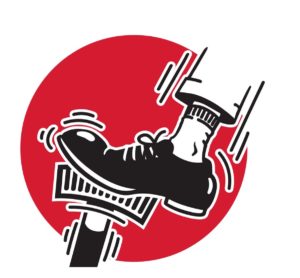People complain a lot when they bring their cars in for brake work. “I just had my car inspected and they’re telling me I need new brakes,” they say. “Didn’t I just get them done?”
It can feel like that here on the edge of the Atlantic Ocean. I’ve had customers who live close to the back shore go through a set of brakes in just one year. The constant salty wind just rusted them out.
 But the sticky, salty air is all around us here, not just right next to the ocean. Someone’s going to tell me I’m wrong about this, but my theory is even the dew is salty. I get plenty of rusted brakes visits from my “low-milers” — folks who keep a car for local errands but hardly drive at all. When a car just sits there, things rust more quickly. It would help just to take the car out for a drive every day to blow that lingering, salty moisture out.
But the sticky, salty air is all around us here, not just right next to the ocean. Someone’s going to tell me I’m wrong about this, but my theory is even the dew is salty. I get plenty of rusted brakes visits from my “low-milers” — folks who keep a car for local errands but hardly drive at all. When a car just sits there, things rust more quickly. It would help just to take the car out for a drive every day to blow that lingering, salty moisture out.
So, we do go through brakes — and cars — here quicker than they do in the Arizona desert. On average, I’d say brakes last about three or four years here. But what’s seen on a quick visual inspection isn’t always right. Before you spring for a replacement, it’s worth spending a little money on having your mechanic take a closer look. At the shop, they’ll put the car up and inspect the caliper slides, brake pad thickness, and rotor condition to assess the overall condition of your brakes.
It’s not always an inspection that gets people thinking about their brakes. As you drive your car, there are things to notice that ought to get you in to your garage: Are the brakes “fading” — that is, do they feel soft? You might also notice a vibration when braking or a change in the height of your brake pedal. Those are signs of trouble.
There are also a couple of things you can do as a driver to get your brakes to last longer. One is to avoid hard stopping. Every time you barrel towards a light or punch it past somebody and then have to jam on the brakes, you’re wasting your brake pads. Also, pay attention to the hydraulics. Having the calipers serviced every year — simply lubricating where the pads meet the holders so they don’t seize up — and changing the brake fluid every two years will help.
When the time has come to replace your brakes, you might be tempted to save money by just replacing the pads. I don’t recommend that. The rotor and pads work together and wear in such a way that grooves and bumps won’t align properly. Most times, you’ll find yourself back in the garage because that half-way repair creates noise and vibration and overheats the brakes. What you can do to save some money is focus on replacing the brakes on just one axle — do both front brakes or both back ones, whichever set needs it most.
One thing that would definitely keep your brakes from corroding so fast in this salty air is a garage — though that is pretty much an unknown thing on Cape Cod. If you’re tired of spending money on your brakes, you could consider spending it on a builder instead.



